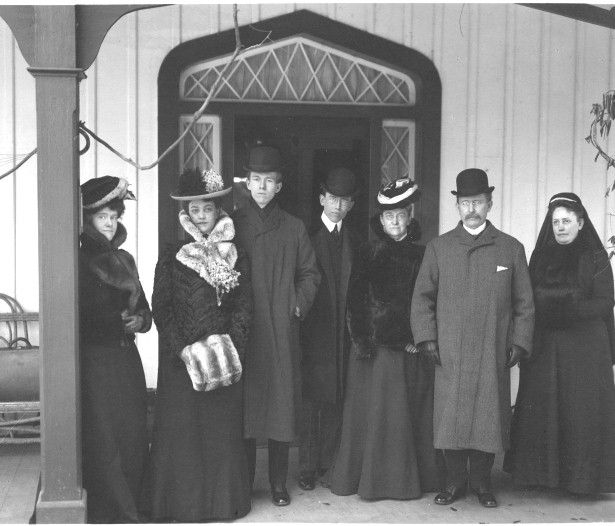After almost completing four years at the Virginia Military Institute (VMI), George C. Marshall embarked on his next journey, commissioning into the U.S. Army. The recent expansion of the army had increased the number of vacancies for new lieutenancies, but by the time Marshall was able to take the qualifying exam in September 1901 only 142 vacancies remained with over 10,000 applications on file.
During his interviews with Forrest Pogue, Marshall discussed his first trip to Washington, D.C. in April 1901 when he tried to get an appointment to sit for the military exam. He met with newly appointed attorney general Philander Knox, who was a friend of his father’s and the chairman of the House Military Affairs Committee, John A. Hull, a distant connection through his mother’s family by marriage.
Without an appointment, Marshall went to the White House. “The office was on the second floor, which is now among the bedrooms and the upstairs private sitting rooms of the president…The old colored man asked if I had an appointment and I told him I didn’t. Well, he said, I never would get in, there wasn’t any possibility. “ Marshall waited for ten or fifteen minutes. A man, his wife and daughter were next in line to meet President McKinley, so Marshall he attached himself “to the tail of the procession and that way I gained the president’s office.” Marshall merely waited until the family met the president and left him standing there with the president. “Mr. McKinley, in a very nice manner, said what did I want. I stated my case to him. I don’t recall exactly what I said, but from that I think flowed my appointment, rather my authority to appear for examination.”
Marshall also had the support of prominent VMI alumnus John S. Wise. At the request of Marshall’s father, Wise had written a letter of recommendation to President McKinley on January 30, 1901. Later Wise wrote another recommendation that Marshall presented when he appeared before the examination board on September 23, 1901. Wise wrote, “This boy has the very highest testimonials. He was first Captain at the Va. Mil. Ins. [VMI] & had a good class standing. Gen: Shipp, the Superintendent regards him as one of the fittest pieces of food for gunpowder turned out by his mill for many years.” The three-day examination for commission was scheduled at Governors Island in New York in early September; however, due to President McKinley’s assassination, the test was postponed until the 23rd of September.
 On October 8, 1901, the Examining Board reported, “The applicant, George Catlett Marshall, Jr., Danville Military Institute, Danville, Virginia, having attained an average in each subject, the board considers him as having passed, and as well qualified for the position of a commissioned officer in the United States Army.” The report goes on to say, “The board, however, finds that Mr. Marshall will not be twenty-one years of age until December 31, 1901. It therefore recommends that he be commissioned after that date. He is recommended for artillery on account of high standings.” In addition to the anxiety Marshall must have felt waiting to begin his career in the army, the delay in being commissioned was also keeping him from marrying Elizabeth “Lilly” Carter Coles since civilian appointees had to be single at the time of commissioning.
On October 8, 1901, the Examining Board reported, “The applicant, George Catlett Marshall, Jr., Danville Military Institute, Danville, Virginia, having attained an average in each subject, the board considers him as having passed, and as well qualified for the position of a commissioned officer in the United States Army.” The report goes on to say, “The board, however, finds that Mr. Marshall will not be twenty-one years of age until December 31, 1901. It therefore recommends that he be commissioned after that date. He is recommended for artillery on account of high standings.” In addition to the anxiety Marshall must have felt waiting to begin his career in the army, the delay in being commissioned was also keeping him from marrying Elizabeth “Lilly” Carter Coles since civilian appointees had to be single at the time of commissioning.
After resigning from his position at the Danville Military Institute where he was commandant, he returned to Uniontown, Pennsylvania and on January 6, 1902, received his nomination for a commission in the Thirtieth Infantry Regiment, stationed in the Philippines. The assignment surprised Marshall since it contradicted the recommendation of the Examining Board that he previously received. His father had two friends in write to the then Senator Matthew Quay, who queried the War Department. The adjutant general replied, “no vacancies as second lieutenants of artillery to be filled by candidates from civil life. The only remedy for Mr. Marshall is to arrange a mutual transfer with someone in artillery who desires infantry.” On February 3rd Marshall returned his signed oath of office as an infantryman.
If you like reading our blogs, please support us by becoming a member of the Foundation or making a donation.
